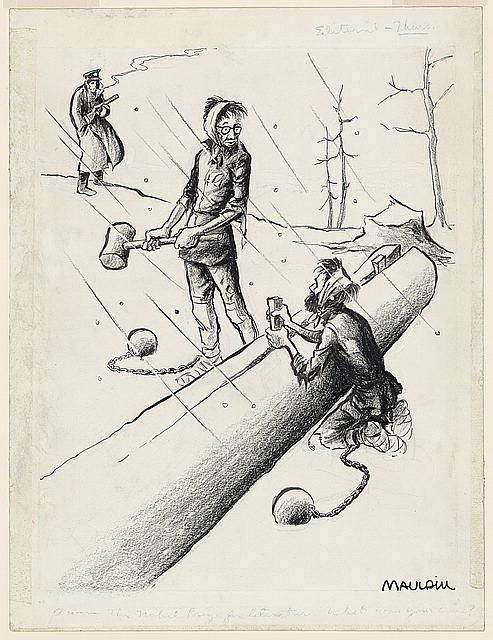I thought it would be an interesting look into our nation's political cartoon history if, this month, I took a look at a different editorial cartoon each day that won the Pulitzer Prize for Editorial Cartooning. Do note that we're talking basically 1922-1967 here, as since then, the Committee has awarded cartoonists generally for their work, not for an exemplary single cartoon. So in many ways, this is a snapshot of American politics (for better or for worse) over a forty-five year period. Here is an archive of the cartoons featured thus far.
Today we look at Bill Mauldin's 1959 award-winning cartoon.
Enjoy!
I featured Bill Mauldin (1921-2003) in the Month of Political Cartooning Stars.
Famous for his work during World War II as a war correspondent/cartoonist, after the war, Mauldin found his non-war cartoons were not as popular, so he drifted from career to career during the late 40s and early 50s, trying many different things, including acting and a career in politics.
Ultimately, he returned to editorial cartooning in the late 1950s, when he replaced the legendary cartoonist Daniel Fitzpatrick at the St. Louis Dispatch in 1958. His return to cartooning grew great acclaim, and he actually won the Pulitzer Prize for a cartoon he did in his FIRST YEAR back!
Boris Pasternak (1890-1960) is best known to the world as the author of the classic novel, Doctor Zhivago. However, in Russia, he is best known as a poet, primarily for his 1921 book of poems (written four years earlier) called My Sister Life. The collection quickly became one of the most famous collection of poems in all of Russia.
Pasternak, through his life, generally managed to keep on the right side of the Communist regime in the Soviet Union, but even this was tested a bit when he received the Novel Prize for Literature in 1958.
At first, he was happy. On October 25, 1958 he sent the following telegram to the Academy:
Immensely thankful, touched, proud, astonished, abashed.
However, on Ocotber 29, he sent a follow-up telegram:
Considering the meaning this award has been given in the society to which I belong, I must refuse it. Please do not take offense at my voluntary rejection.
While never confirmed, it was greatly suggested at the time that Pasternak was afraid that if he left the USSR, he would not be welcomed back. And since he had spent so many years making sure that he WOULD be accepted by the current regime (Pasternak even ceased doing poetry for many years, for fear his poetry could be seen as subversive), he likely did not want to risk it. And since in the years following, Pasternak DID draw some undue attention from the political leaders of the USSR (who came close to forcing him out of the country), he was most likely correct.
In any event, while Pasternak claimed it was his own decision, Mauldin produced a cartoon the next day, October 30, 1958, mocking the situation Pasternak seemed to be in.
The piece was titled "I won the Nobel Prize for literature. What was your crime?"
Pasternak passed away from lung cancer in 1960.


